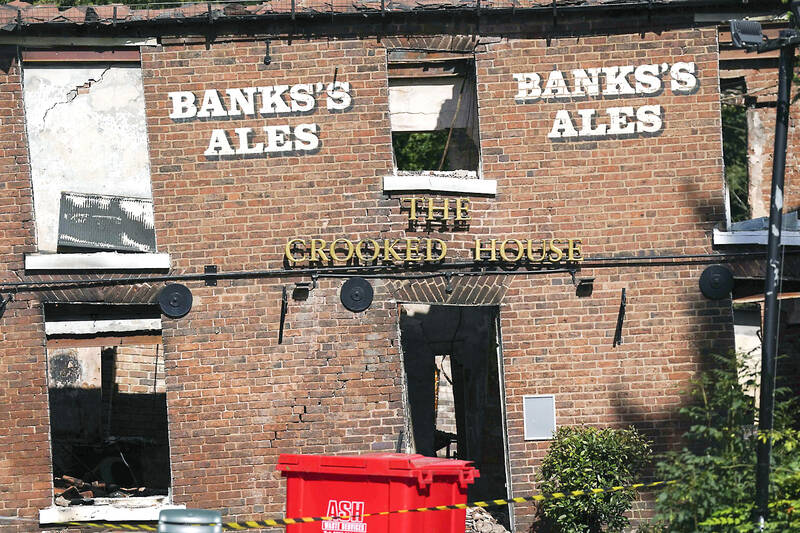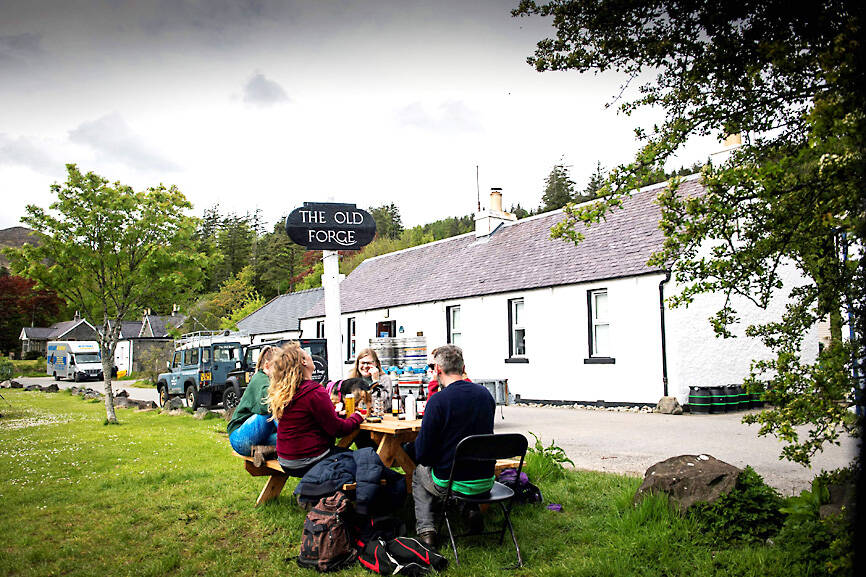With a 15° list making one end 1.2m lower than the other, the historic Crooked House pub looked as if could topple over at any minute.
However, despite its precarious appearance, the quirky 18th century hostelry stood at the heart of its community in the small central English village of Himley for 260 years.
That is until late last month, when the historic watering hole was sold and promptly burned down just over a week later.

Photo: AP
To the horror of locals, bulldozers then moved in and reduced the burned-out pub to rubble.
Police are investigating the blaze as arson, while planning authorities insist they only gave permission for the building to be made safe, not razed entirely.
The case has not only caused outrage among locals, but highlighted the threat facing the nation’s pubs, which have been battered by successive crises.

Photo: AFP
About 30 British pubs close their doors each month, according to the Campaign for Real Ale (CAMRA), a lobby group which promotes traditional drinks and pubs.
Paul Ainsworth, chairman of CAMRA’s pub heritage group, said that the loss of the “unique” and “amazing” Crooked House was an “absolute tragedy.”
Even if calls for it to be rebuilt were successful it would “never be the same because its unique atmosphere stemmed from its age and its history,” he added.
Campaigners say the loss of such pubs rips the heart from local communities.
Once sold, new owners under a law introduced in 2017 need planning permission to repurpose the sites.
However, CAMRA said that 31 pubs were knocked down or converted without approval between January and June.
In a letter to British Prime Minister Rishi Sunak, the Campaign for Pubs last week denounced what it called “predatory purchasing and asset stripping of historic pubs” and called for action from central government to enforce the law.
Pubs — a central part of British life for centuries — have been struggling for many years as people’s drinking habits have changed.
Most recently, COVID-19 pandemic shutdowns and massive increases in energy prices this winter driven by Russia’s invasion of Ukraine have taken a devastating toll.
Some pubs’ bill rose more than 300 percent, as part of a wider cost-of-living crisis, six of the country’s biggest pub and brewing firms said.
Ainsworth said that many pubs were just poorly run, resulting in a downward spiral.
Others, were deliberately allowed to fail as part of a strategy by owners to get the pub converted into a residential property in a prime spot, he said.
After the sale of the Crooked House — famed for its bar on which marbles or coins would appear to roll uphill — thousands of people signed an online petition calling for it to be saved.
Paul Turner, who started the petition, said that properly marketed, the pub could “attract visitors from all over the world.”
Turner, 58, said he was “absolutely devastated” by the subsequent blaze, adding that the place had been “part of my childhood.”
In the past few days, locals have turned out in droves to mourn their pub’s destruction.
Some have placed flowers and placards in the rubble with slogans such as “More than a pub” and “Straight answers for our crooked house.”
Ainsworth said that the best hope for the Himley community was that authorities ordered the rebuilding of the pub, paving the way for some sort of community takeover.
Since 2017 there has been a growing trend for communities to club together and take ownership of their pubs.
Although they represent just a fraction of the 47,000 pubs nationwide, he said the 205 in the hands of their communities represented real hope for people faced with the loss of their local.
One of the most recent is Scotland’s Old Forge, which has just reopened after being bought by a remote Highland community in March last year.
Locals raised £1 million (US$1.27 million) to buy it from its Belgian owner.
Ainsworth said the trend was “creating pubs which are by and large community focused, lovely places to be, serving the interests of the local community.”
“Places that had become sad places are now extremely happy places,” he said.

Intel Corp chief executive officer Lip-Bu Tan (陳立武) is expected to meet with Taiwanese suppliers next month in conjunction with the opening of the Computex Taipei trade show, supply chain sources said on Monday. The visit, the first for Tan to Taiwan since assuming his new post last month, would be aimed at enhancing Intel’s ties with suppliers in Taiwan as he attempts to help turn around the struggling US chipmaker, the sources said. Tan is to hold a banquet to celebrate Intel’s 40-year presence in Taiwan before Computex opens on May 20 and invite dozens of Taiwanese suppliers to exchange views

Application-specific integrated circuit designer Faraday Technology Corp (智原) yesterday said that although revenue this quarter would decline 30 percent from last quarter, it retained its full-year forecast of revenue growth of 100 percent. The company attributed the quarterly drop to a slowdown in customers’ production of chips using Faraday’s advanced packaging technology. The company is still confident about its revenue growth this year, given its strong “design-win” — or the projects it won to help customers design their chips, Faraday president Steve Wang (王國雍) told an online earnings conference. “The design-win this year is better than we expected. We believe we will win

Chizuko Kimura has become the first female sushi chef in the world to win a Michelin star, fulfilling a promise she made to her dying husband to continue his legacy. The 54-year-old Japanese chef regained the Michelin star her late husband, Shunei Kimura, won three years ago for their Sushi Shunei restaurant in Paris. For Shunei Kimura, the star was a dream come true. However, the joy was short-lived. He died from cancer just three months later in June 2022. He was 65. The following year, the restaurant in the heart of Montmartre lost its star rating. Chizuko Kimura insisted that the new star is still down

While China’s leaders use their economic and political might to fight US President Donald Trump’s trade war “to the end,” its army of social media soldiers are embarking on a more humorous campaign online. Trump’s tariff blitz has seen Washington and Beijing impose eye-watering duties on imports from the other, fanning a standoff between the economic superpowers that has sparked global recession fears and sent markets into a tailspin. Trump says his policy is a response to years of being “ripped off” by other countries and aims to bring manufacturing to the US, forcing companies to employ US workers. However, China’s online warriors